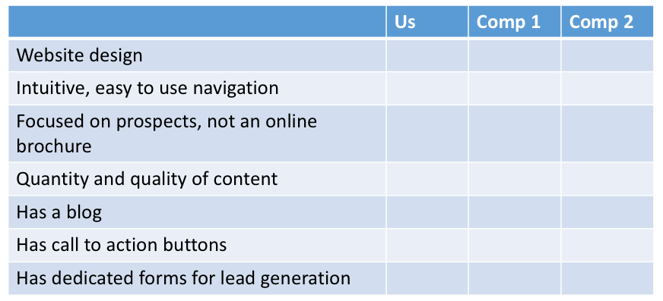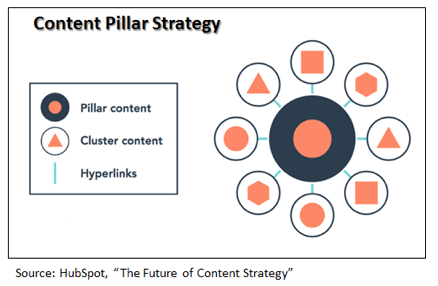What CPA firm managing and marketing partners should know about your competitors’ digital marketing efforts.
Q: How do you know if you need to put more resources and budget into your firm’s online or inbound marketing program to beat competitors?
A1: Do a competitive analysis to see what they’re doing and how you stack up.
A2: Get the comparative data for free.
The marketing and managing partner at any professional service firm needs to be armed with data, insights and observations about the state of their digital marketing program, especially in comparison to the firm’s competitors. In a digital environment, everything can be measured and there are a huge number of companies who want to give you data for free.
Having too much data is a direct path to analysis paralysis, so I’ve put together a list of six questions that partners and marketers should be investigating – and free resources where they can be answered.
6 Questions about Your Competitors’ Digital Marketing You’ll Want to Know
It’s time to huddle up around the conference room table and experience a couple of moments of truth. BTW, these are all live examples from a Top 200 firm located in the Southwest. I’m not releasing their name in order to protect the guilty:
1. How does our digital marketing program stack up overall against our competitors?
The first set of insights you’ll want to have is to get a broad based score of how your digital marketing program stacks up against the competition.
That’s a job for HubSpot’s Marketing Grader.
This free tool scores websites to look at proficiency in blogging, social media, SEO and whether or not the site is being used for lead generation. It will also take a look at how a website is being displayed for mobile users – an increasingly important part of being responsive to the way that prospects are now accessing your key digital asset. Of course, you’ll want to run the Grader on both your firm and your competitors.

You can get HubSpot’s Marketing Grader here.
2. How is our website performing relative to our competition? (Part 1 - Quantitative)
One of our favorite tools that provides competitive data across a number of dimensions is QUICKSPROUT. Here, you’ll find a website analyzer, social media analysis, and a competitive analysis tool. You’ll get scores for SEO, website speed, and details about specific problems and suggested fixes.

3. How is our website performing relative to our competition?
Let’s get off of the pure data driven analytic path for a moment and use another free tool – your eyeballs – to take a look at site performance from the eyes of a visitor. When your team is sitting around the table, put your website and those of your key competitors up on the screen, and come to a consensus about these 7 qualitative variables.
(Note: I’m counting on honesty here!)
Scoring: Scale of 1 to 5, where 1 = absolutely, fundamentally terrible; and 5 = digital marketing nirvana

4. What kind of “authority” does our website have relative to our competitors?
Another tool for your competitive analysis profile is Open Site Explorer. This tool will evaluate backlinks and website strength. From a competitive analysis perspective, this is importance because the data represents a measure of authority: the higher the authority a website has, the higher its search engine ranking.
Open Site Explorer will provide the following:
- Page Authority: The quality score of your web pages (based on link metrics)
- Domain Authority: The quality score of your website (as a whole, based on link metrics)
- Linking Root Domains: The number of domains (separate websites) linking to you directly from their website (as opposed to multiple links coming from the same site)
- Total Links: The total quantity of links points to your website
- Social Signals: This includes social media metrics that have a positive correlation with rankings. These include Facebook shares, Facebook Likes, and Google +1
You can get Open Site Explorer here.

5. What are the top keywords that our competitors rank for?
SEMRush is a free tool for entering domains and getting a perspective on ten of the top keywords that a website ranks for organically. It will show the keyword, position in search results, and traffic percentage among other information. You can get SEMRushhere.
From a competitive perspective, this data is important because it should help you in making decisions about how to select and use keywords that can give you differentiation and advantage when it comes to search marketing.

6. When it comes to site visitors and traffic, how do we rank compared to our competitors?
For competitive evaluation purposes, you’ll also want to know how your website ranks, in terms of traffic, again your competition. For this data, you’ll want to visit the Alexa website, here.
Here’s another cool thing – a free browser extension that when you surf the web you can access any site's rank, discover similar sites, and see how a site looked in the past.

There Ain’t No Free Lunch
While all of the sites I’ve discussed have free versions, the real action (more data and analysis) comes in their paid versions. Can you get enough through the free versions to do a decent competitive analysis? Absolutely! It still makes sense, however, to spend some time investigating whether or not an additional investment is warranted for the more powerful versions each site offers.
If you see that your firm is underperforming, then it’s time to take a deeper dive and find some solutions. Whether you use staff time or hire a digital marketing agency like VitbergLLC to help, there’s going to be an investment required.
And after you see the comparative data, the bigger the GULP you make, the greater the investment you’ll face!
.png)







Leave a Comment